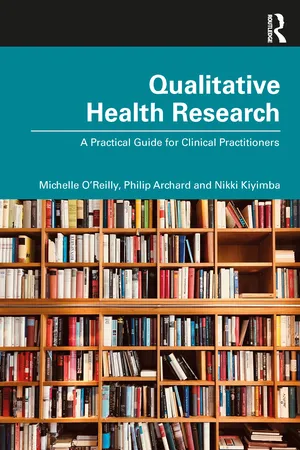
Qualitative Health Research
A Practical Guide for Clinical Practitioners
- 382 pages
- English
- ePUB (mobile friendly)
- Available on iOS & Android
Qualitative Health Research
A Practical Guide for Clinical Practitioners
About this book
This accessible text supports health practitioners undertaking qualitative research to inform clinical practice, guiding readers through the decision-making process from planning and proposing, through data collection, to dissemination and impact. Qualitative research makes an important contribution to the health evidence base, including improving service provision, practitioner communication, and patient safety, as well as informing policies, generating important knowledge about health, and providing populations with a voice in the health context.
Balancing the need for practitioners to operate in an evidence-informed way, the increasing role of a research culture in the health service, and the everyday clinical demands faced in practice, this book includes strategies for managing the reality of undertaking qualitative research while working in clinical practice and includes a wide range of "bite size" chapters on topics such as:
- Quality improvement
- Evidence-based practice and practice-based evidence
- Managing dual roles
- Planning a project
- Working with stakeholders
- Ethics
- Data collection methods
- Conducting digital research
- Recruitment and sampling
- Data management
- Analytical approaches
- Thematic approaches
- Research with vulnerable groups
- Dissemination
- Translating research into practice.
This book is a practical resource for clinical researchers, designed to support the application of learning. Each chapter opens with learning objectives, and ends with a reflection on the chapter, integrating case examples and highlighting core issues. Practitioner experience boxes and reflective activities bring an invaluable real-world perspective to each chapter.
Qualitative Health Research is the ideal text for all healthcare practitioners and trainees new to qualitative research, including those from medicine, nursing, midwifery, psychology, allied health, and public health.
Frequently asked questions
- Essential is ideal for learners and professionals who enjoy exploring a wide range of subjects. Access the Essential Library with 800,000+ trusted titles and best-sellers across business, personal growth, and the humanities. Includes unlimited reading time and Standard Read Aloud voice.
- Complete: Perfect for advanced learners and researchers needing full, unrestricted access. Unlock 1.4M+ books across hundreds of subjects, including academic and specialized titles. The Complete Plan also includes advanced features like Premium Read Aloud and Research Assistant.
Please note we cannot support devices running on iOS 13 and Android 7 or earlier. Learn more about using the app.
Information
Table of contents
- Cover
- Half-Title
- Title
- Copyright
- Dedication
- Contents
- About the authors
- Acknowledgements
- Abbreviations
- 1 Introduction – the clinician-researcher
- 2 Quality improvement: Differentiating audit, service evaluation, and research
- 3 Theory in qualitative research
- 4 Evidence-based practice and practice-based evidence
- 5 Planning a project
- 6 Types of qualitative research
- 7 Working with gatekeepers, stakeholders and experts by experience
- 8 Ethics and integrity
- 9 Dual roles – the clinician and researcher roles
- 10 Sampling and recruitment
- 11 Sensitivity, vulnerability, and barriers to participation
- 12 Managing researcher safety
- 13 Methods of data collection
- 14 Interviews and focus groups
- 15 Qualitative health research and digital technologies
- 16 Transcription and data management
- 17 Using clinical skills in research
- 18 Thematic approaches and coding data
- 19 Common analytic approaches
- 20 Dissemination and translating research into practice
- Index